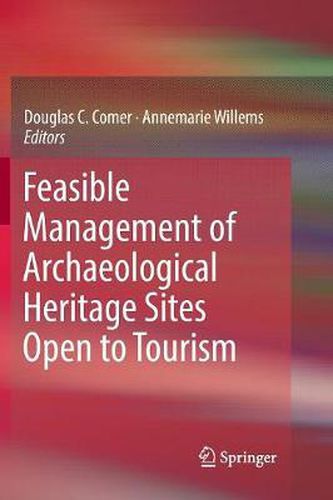Readings Newsletter
Become a Readings Member to make your shopping experience even easier.
Sign in or sign up for free!
You’re not far away from qualifying for FREE standard shipping within Australia
You’ve qualified for FREE standard shipping within Australia
The cart is loading…






This title is printed to order. This book may have been self-published. If so, we cannot guarantee the quality of the content. In the main most books will have gone through the editing process however some may not. We therefore suggest that you be aware of this before ordering this book. If in doubt check either the author or publisher’s details as we are unable to accept any returns unless they are faulty. Please contact us if you have any questions.
Archaeological sites opened to the public, and especially those highly photogenic sites that have achieved iconic status, are often major tourist attractions. By opening an archaeological site to tourism, threats and opportunities will emerge.The threats are to the archaeological record, the pre-historic or historic materials in context at the site that can provide facts about human history and the human relationship to the environment. The opportunities are to share what can be learned at archaeological sites and how it can be learned. The latter is important because doing so can build a public constituency for archaeology that appreciates and will support the potential of archaeology to contribute to conversations about contemporary issues, such as the root causes and possible solutions to conflict among humans and the social implications of environmental degradation.
In this volume we will consider factors that render effective management of archaeological sites open to the public feasible, and therefore sustainable. We approach this in two ways: The first is by presenting some promising ways to assess and enhance the feasibility of establishing effective management. Assessing feasibility involves examining tourism potential, which must consider the demographic sectors from which visitors to the site are drawn or might be in the future, identifying preservation issues associated with hosting visitors from the various demographic sectors, and the possibility and means by which local communities might be engaged in identifying issues and generating long-term support for effective management. The second part of the book will provide brief case studies of places and ways in which the feasibility of sustainable management has been improved.
$9.00 standard shipping within Australia
FREE standard shipping within Australia for orders over $100.00
Express & International shipping calculated at checkout
This title is printed to order. This book may have been self-published. If so, we cannot guarantee the quality of the content. In the main most books will have gone through the editing process however some may not. We therefore suggest that you be aware of this before ordering this book. If in doubt check either the author or publisher’s details as we are unable to accept any returns unless they are faulty. Please contact us if you have any questions.
Archaeological sites opened to the public, and especially those highly photogenic sites that have achieved iconic status, are often major tourist attractions. By opening an archaeological site to tourism, threats and opportunities will emerge.The threats are to the archaeological record, the pre-historic or historic materials in context at the site that can provide facts about human history and the human relationship to the environment. The opportunities are to share what can be learned at archaeological sites and how it can be learned. The latter is important because doing so can build a public constituency for archaeology that appreciates and will support the potential of archaeology to contribute to conversations about contemporary issues, such as the root causes and possible solutions to conflict among humans and the social implications of environmental degradation.
In this volume we will consider factors that render effective management of archaeological sites open to the public feasible, and therefore sustainable. We approach this in two ways: The first is by presenting some promising ways to assess and enhance the feasibility of establishing effective management. Assessing feasibility involves examining tourism potential, which must consider the demographic sectors from which visitors to the site are drawn or might be in the future, identifying preservation issues associated with hosting visitors from the various demographic sectors, and the possibility and means by which local communities might be engaged in identifying issues and generating long-term support for effective management. The second part of the book will provide brief case studies of places and ways in which the feasibility of sustainable management has been improved.